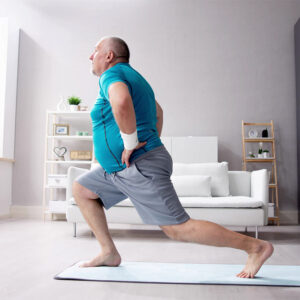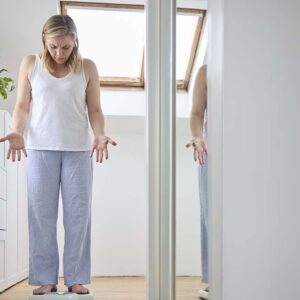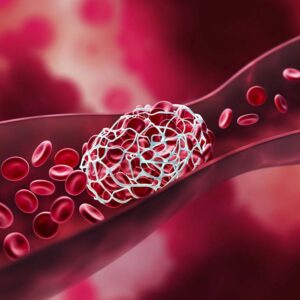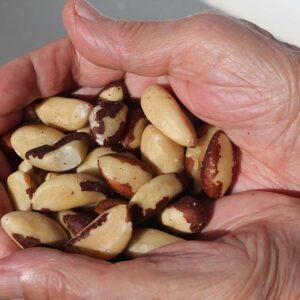
Did Hemorrhoids Take Down the French Empire?
- Napoleon’s struggle with a well-known medical condition may have rendered him useless to his army
- 75 percent of all people may find themselves enmeshed in a battle with this uncomfortable condition during their lifetime
- Don’t let pain and discomfort change the course of your history. Find out how to prevent it with these easy tips
Dear Reader,
Picture it.
It’s a warm June day in Europe. You can feel the pounding of horse hooves shaking the ground beneath you and smell the cannon fire hanging in the air. You sink deeper into sullen feelings as you hear the sounds of swords making contact and men screaming as they meet their fate on the battlefield. You are forced to lie paralyzed by great pain in your commander’s tent — knowing you are in too much pain to help your army as they continue to battle the British and Prussian armies.
Suddenly, a high-ranking French officer bursts into your tent and demands you mount your horse and go survey the battlefield.
“We need you out there! It’s the only hope we have to win, sir!” he screams.
You try to stand up. But, you fall right back down. The pain, burning, bleeding, and itching are just too intense for you to go on. As you lie in the tent, you know that you have lost not only this battle, but your reign as emperor of France.
In this scenario, it’s June 18, 1815, and you are Napoleon Bonaparte. You have just succumbed to defat in the Battle of Waterloo.
And the reason why you couldn’t mount your horse to survey the battlefield? Or help your men stave off the advances of the enemy? Or defend your title as the emperor of France?
Because your body is already at war. And not with opposing military forces, but with a hellacious bout of hemorrhoids (also called piles).
That’s right. According to some historians, Napoleon may have lost the Battle of Waterloo due to an extreme case of piles.2

An accurate portrait of Napoleon at Waterloo — standing while in visible pain.
Photo Credit: sainthelenaisland.info
It’s pretty shocking to think such a common, slightly embarrassing condition may have changed the course of history.
But when faced with the fact that 75 percent of people will suffer from hemorrhoids at some point in their lives, it doesn’t seem so far-fetched.2
Today, Living Well Daily is going to lead your through the facts about hemorrhoids. We will discuss what hemorrhoids are, how they are formed, and, most importantly, how to prevent them from becoming your personal Battle of Waterloo.
![]() The Battleground in Your Body
The Battleground in Your Body
Have you gone to the bathroom and found blood in the water when you’re done? Or experienced itching, burning, pain, and pressure of the rectum?
These are the common symptoms of hemorrhoids. And if none of this sounds familiar now, as I mentioned above, you have three in four chance of experiencing at some point in your life.
If you are over age 50, there is a one in two chance that you already have.2
You may be wondering by now: What exactly are hemorrhoids? Let me explain…
Located just under the lining of the bottommost portion of the anus and the rectum, there is a network of soft veins. When these veins become enlarged and inflamed (usually cause by pressure), it creates a hemorrhoid. Hemorrhoids come in two different varieties, internal and external.
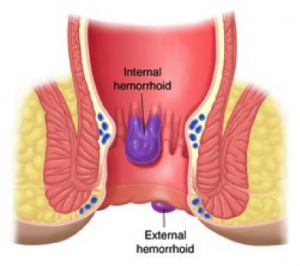
Figure 1 Photo credit: webnat.com
Internal hemorrhoids happen in the lower rectum. While internal hemorrhoids are typically painless, they can produce bleeding than can be seen in the toilet bowl on or on toilet paper after a bowel movement. However, if an internal hemorrhoid becomes prolapsed (when the vein protrudes beyond the anus) it can cause irritation or itching at the site.3
External hemorrhoids can cause pain because they develop under the skin near the anus. In fact, this type of hemorrhoid compromises the skin and causes irritation, and sometimes results in a blood clot. If a blood clot forms, it can cause extreme pain along with a lump close to the anus.3 If Napoleon did have hemorrhoids, it was likely this type.
Hemorrhoids can be caused by any type of added pressure on your blood vessels. This includes actions like straining you muscles during bowel movements, pregnancy, obesity, sitting for long periods of time on the toilet, and improper diet.
And while hemorrhoids already disrupt the lives of over 10 million Americans at any given time, Google Trends indicate this number could be increasing.
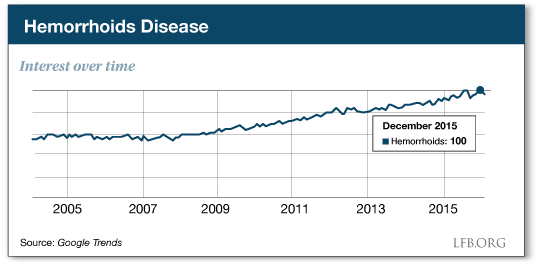
America’s interested has almost doubled over the last 10 years.
When I did a trend search, I found that Google searches for “hemorrhoids” has come close to doubling in the last 10 years.
In fact, hemorrhoids was the most searched health term on Google from 2012–2014.4
While factors like growing computer use and competency may play a role in this climbing number, it may also indicate that lots of cases of hemorrhoids going unreported.
The rapid increase in obesity may also be to blame here. Extra weight on the body can result in restricted blood flow and increased pressure on blood vessels. This added pressure can compromise vein strength and cause the veins to erupt. Obesity is also linked to sedentary lifestyle, poor eating habits, low levels of physical exercise, and irregular bowel movements, which is the main source of hemorrhoids growth.5
Even though it may seem inevitable that you will experience your personal Battle of Waterloo with hemorrhoids, there are a few ways to keep them at bay.
Exercising for 20–30 minutes a day may help stimulate regular bowel movements, which can be helpful in the battle against hemorrhoid development.
Another preventative measure against hemorrhoids is collagen. A study published in Colorectal Disease found that patients suffering from hemorrhoids have significantly reduced collagen ratios compared with those without hemorrhoids.6
Because collagen may help to support vein repair, adding a collagen supplement may be a good defense tactic in your battle against hemorrhoids.7
It’s important to note that hemorrhoids symptoms may sometimes be indicators of more serious conditions like colon cancer and irritable bowel disease. Be sure to contact your health care provider if you experience any blood in your bowel movements or any changes in your digestive health.
If Napoleon had only know hemorrhoid prevention and was so easy, perhaps we would all be reading this article in French.
If you have any natural hemorrhoid hacks, tell me about them! Nmoore@lfb.org
Live well,

Natalie Moore
Managing editor, Living Well Daily
Sources
[1] 7 Things You May Not Know About the Battle of Waterloo
[2] Hemorrhoids
[3] Hemorrhoids and what to do about them
[4] Eliminating Hemorrhoids Once And For All
[5] Obesity And Hemorrhoids: What’s The Connection?
[6] Haemorrhoids – a collagen disease?
[7] Linus Pauling’s Unified Theory of Human Cardiovascular Disease
Written By Natalie Moore
Natalie Moore is a dedicated health researcher with a passion for finding healthy, natural, and science-based solutions. After a decade of direct healthcare experience in western and natural medicine, she was involved in public health research before joining Living Well Daily.
View More Free Articles
Take the SHORTER Path to Dramatically Better Health
Are you tired of fitness gurus preaching the virtues of 5 AM workouts and pushing Olympic-level training regimens? Their narrative can feel exhausting and entirely unattainable. But before you toss in the towel completely, I’ve got news that might just put a spring back into your step. A groundbreaking new study reveals that the key...
Unexpected Perks of Your Coffee Habit Revealed!
We all know that the first cup of coffee in the morning can FEEL like a lifesaver. But what if it might actually BE saving your life? A groundbreaking new study suggests that your daily coffee habit could be protecting you from not just one but multiple chronic diseases. Let’s pour over this fascinating research…...
The TRUTH About Diabetes Drugs and Brain Aging
You’ve probably seen the gushing headlines… Most say something like, “Common diabetes drug protects the brain against aging!” And let’s face it, that sounds fantastic. After all, who doesn’t want to keep their brain young and in tip-top shape? The headlines refer to the results of a new study that suggests the widely prescribed type...
Hidden Smartphone Danger Puts You at Risk
Remember when we thought cell phones were just something for young folks to obsess over? Back when we were convinced they were nothing more than a passing fad? Well, times certainly have changed. Now, most people… including many of us older folks… have jumped on the smartphone bandwagon. Heck, some of us are practically as...
Preserve Your Mobility with “Agile Aging” Exercises
Aging has a way of humbling us. You lose hair where you want to keep it—and often end up growing it where you don’t. With every passing year, your eyesight fades, and your waistline expands. And as your once quick pace begins to slow, you fear developing the dreaded “senior shuffle.” But here’s the thing....
Yes, Lazy Saturday Lie-Ins Can BOOST Your Health
Are you burning the midnight oil during the week and catching up on sleep on weekends? Well, I’ve got some news that might help you feel less guilty about those lazy Saturday mornings. A new study suggests that weekend lie-ins might be doing far more than just helping you feel refreshed. Experts say they could...
Mailbag: 7 Hidden Culprits Behind Your Weight Gain
“Why am I gaining weight, even though I am watching what I am eating?” – Battling the Bulge Dear Battling, Gaining weight when you’re not trying to is frustrating. And it just gets worse as we age… often regardless of our diet. The truth is that various factors can promote weight gain even when you’re...
Popular Artificial Sweetener Linked to Dangerous Heart Risk
Remember when erythritol was the darling of the health food world? Well, this popular sugar substitute might not be as sweet a deal as we were led to believe… A shocking new study reveals a dark side to this widely used artificial sweetener. It turns out erythritol is associated with a dangerous—and even deadly—heart risk....
Cracking the Code on Chronic Inflammation
Inflammation and obesity are the evil tag team at the heart of nearly every major disease we face—from diabetes to obesity. What starts as a normal, healthy process to fend off dangerous invaders can quickly fan into the flames of chronic inflammation… and that includes in your gut. The trouble is almost no one has...
Dreaming of Better Sleep? Your Gut Holds the Key
Do you toss and turn at night? If so, you’re not alone. In fact, if you’re a senior over 65, you join nearly 17 percent of your peers who ALSO struggle with poor sleep quality. But science has uncovered a natural supplement that not only could help you catch more Z’s but can also give...




